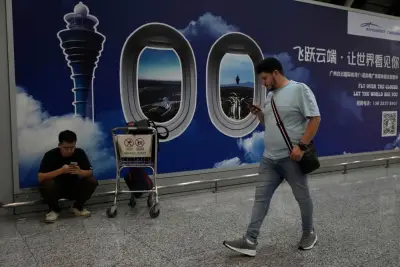China rolls out its version of the H-1B visa to attract foreign tech workers

By CHAN HO-HIM AP Business Writer HONG KONG AP Vaishnavi Srinivasagopalan a skilled Indian IT professional who has worked in both India and the U S has been looking for work in China Beijing s new K-visa activity targeting science and apparatus workers could turn that dream into a reality Related Articles Car blast near New Delhi s historic Red Fort kills at least people India s police say Canada loses measles elimination status after ongoing outbreaks UN environment talks start with a call for faster action but the US is absent Netanyahu and Kushner meet as Gaza ceasefire s first phase winds down Currently in History November storm sends freighter to the bottom of Lake Superior The K-visa rolled out by Beijing last month is part of China s widening effort to catch up with the U S in the race for global talent and cutting edge innovation It coincides with uncertainties over the U S s H- B activity under tightened immigrations policies implemented by President Donald Trump The K-visa for China is an equivalent to the H- B for the U S revealed Srinivasagopalan who is intrigued by China s working habitat and custom after her father worked at a Chinese university a sparse years back It is a good option for people like me to work abroad The K-visa supplements China s existing visa schemes including the R-visa for foreign professionals but with loosened requirements such as not requiring an applicant to have a job offer before applying Stricter U S policies toward foreign students and scholars under Trump including the raising of fees for the H- B visa for foreign skilled workers to for new applicants are leading various non-American professionals and students to consider going elsewhere Students studying in the U S hoped for an H- B visa but right now this is an issue reported Bikash Kali Das an Indian masters aspirant of international relations at Sichuan University in China China wants more foreign tech professionals China is striking while the iron is hot The ruling Communist Party has made global leadership in advanced technologies a top priority paying massive administration subsidies to assistance research and enhancement of areas such as artificial intelligence semiconductors and robotics Beijing perceives the tightening of immigration policies in the U S as an opportunity to position itself globally as welcoming foreign talent and assets more broadly reported Barbara Kelemen associate director and head of Asia at prevention intelligence firm Dragonfly Unemployment among Chinese graduates remains high and competition is intense for jobs in scientific and technical fields But there is a skills gap China s leadership is eager to fill For decades China has been losing top talent to developed countries as multiple stayed and worked in the U S and Europe after they finished studies there The brain drain has not fully reversed Multiple Chinese parents still see Western teaching as advanced and are eager to send their children abroad mentioned Alfred Wu an associate professor at the National University of Singapore Still in new years a growing number of professionals including AI experts scientists and engineers have moved to China from the U S including Chinese-Americans Fei Su a chip architect at Intel and Ming Zhou a leading engineer at U S -based program firm Altair were among those who have taken teaching jobs in China this year Plenty of skilled workers in India and Southeast Asia have already expressed interest about the K-visa mentioned Edward Hu a Shanghai-based immigration director at the consultancy Newland Chase Questions about extra competition from foreign workers With the jobless rate for Chinese aged - excluding students at nearly the campaign to attract more foreign professionals is raising questions The current job sphere is already under fierce competition reported Zhou Xinying a -year-old postgraduate attendee in behavioral science at eastern China s Zhejiang University While foreign professionals could help bring about new technologies and different international perspectives Zhou explained chosen Chinese young job seekers may feel pressure due to the introduction of the K-visa plan Kyle Huang a -year-old system engineer based in the southern city of Guangzhou mentioned his peers in the science and tool fields fear the new visa scheme might threaten local job opportunities A newest commentary published by a state-backed news outlet the Shanghai Observer downplayed such concerns saying that bringing in such foreign professionals will benefit the financial system As China advances in areas such as AI and cutting-edge semiconductors there is a gap and mismatch between qualified jobseekers and the demand for skilled workers it noted The more complex the global surroundings the more China will open its arms it noted Beijing will need to emphasize how select foreign talent can create not take local jobs explained Michael Feller chief strategist at consultancy Geopolitical Strategy But even Washington has shown that this is politically a hard argument to make despite decades of evidence China s disadvantages even with the new visas Recruitment and immigration specialists say foreign workers face various hurdles in China One is the language barrier The ruling Communist Party s internet censorship known as the Great Firewall is another drawback A country of about billion China had only an estimated foreign workers residing in the country as of The U S still leads in research and has the advantage of using English widely There s also still a relatively clearer pathway to residency for countless announced David Stepat country director for Singapore at the consultancy Dezan Shira Associates Nikhil Swaminathan an Indian H -B visa holder working for a U S non-profit organization after finishing graduate school there is interested in China s K-visa but skeptical I would ve considered it China s a great place to work in tech if not for the demanding relationship between India and China he commented Given a choice a multitude of jobseekers still are likely to aim for jobs in leading global companies outside China The U S is likely more at pitfall of losing would-be H- B applicants to other Western economies including the UK and European Union than to China announced Feller at Geopolitical Strategy The U S may be sabotaging itself but it s doing so from a far more competitive position in terms of its attractiveness to talent Feller declared China will need to do far more than offer convenient visa pathways to attract the best AP writer Fu Ting in Washington and researchers Yu Bing and Shihuan Chen in Beijing contributed
